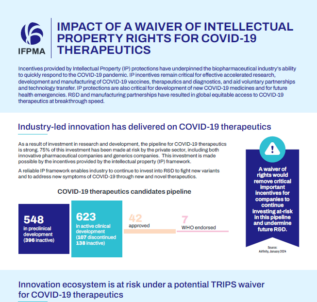WIPO standing committee on the law of patents
IFPMA Statement to the
WIPO Standing Committee on the Law of Patents (SCP)
Remarks by Mr. Andrew Jenner,
Director, Intellectual Property & Trade, IFPMA
Mr. Chairman
The International Federation of Pharmaceutical Manufactures and Associations (IFPMA) would like to thank you for the opportunity to input on the important discussions within the SCP. The IFPMA represents the leading research-based pharmaceutical companies as well as national and regional industry associations across all five continents.
We are grateful to the external experts and the Secretariat for the extensive studies on the topic of exclusions and limitations, which have enriched the debates in this Committee. When formulating police options, solid empirical evidence remain key to ensure that the desired result is achieved. In relation to the studies, we would like to offer some comments on patent exception and limitations in the health context, the main subject of Professor’s Visser’s study.
We strongly believe that sustainable access to quality medicines can only be achieved by creating the necessary incentives for medicines innovation. It is also vital that other crucial pieces of the access picture are in place – including ensuring appropriate levels of health care infrastructure and financing. If these factors are not in place, or fail to operate effectively, then the objective of medicine access will be clearly undermined. Compulsory licensing is not a sustainable approach, as it is creates a strong disincentive to develop and market new medicines (which requires passing then through a costly and lengthy regulatory process). Innovative companies are less likely to introduce products when copiers can immediately enter the markets undermining R&D investment. Without a local launch of the innovative product, generic companies may not be able to obtain the necessary Regulatory approvals to sell their products. Widespread use of compulsory licenses may therefore deny or delay patients’ access to innovative products, and hinder the introduction of good quality generic versions in the longer term.
The improvement of global health is a commitment shared by the research-based pharmaceutical industry and WIPO’s Member-States. We welcome closer collaboration between the three Intergovernmental organizations – WIPO, WHO & WTO – in working to achieve this goal. IFPMA companies have undertaken numerous multi-faceted initiatives to facilitate broader medicine development and improve access. These practical measures include: the provision of educational grants, training of health care professionals and support to the regulatory and health care infrastructure development. In relation to access to medicines, numerous initiatives have been developed and deployed, such as preferential pricing, donations, voluntary licensing and capacity building.
We need initiatives and platforms which incentivise, and not undermine, innovation. Our companies are fully committed to researching and developing new and more effective treatments – but ensuring the correct policy environment, which remains the role of Governments, is a critical aspect of meeting long-term global health challenges we all face.
Thank you.
Geneva, 12 October 2010
About IFPMA
The International Federation of Pharmaceutical Manufacturers and Associations (IFPMA) represents over 90 innovative pharmaceutical companies and associations around the world. Our industry’s almost three million employees discover, develop, and deliver medicines and vaccines that advance global health. Based in Geneva, IFPMA has official relations with the United Nations and contributes industry expertise to help the global health community improve the lives of people everywhere. For more information, visit ifpma.org.
Learn more




